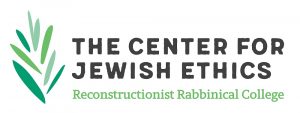Respect and Responsibility is a cross-denominational collection of texts designed for use in Jewish organizations to establish readiness for cultivating cultures of safety and respect. This essential preparatory stage prepares organizations for later policy development and training by using Jewish texts to explore contemporary issues related to preventing and responding to harassment, sexual abuse, and other institutional abuses of power.

In this piece, the author draws on Jewish teachings and educational theory to argue for prioritizing careful and skillful teaching, ethics, and integrity — not charisma — when hiring, guiding, and...

This prayer for humility reminds us that it is not our own moral superiority or wisdom that helps us reach difficult conclusions. We do not rejoice in the stumbling of our friends or colleagues nor in...

This alternate version of Al Chet (For the Sin), traditionally read during Yom Kippur, allows us to reflect on our possible complicity in abuses of power within our own communities. Reflecting on how ...

In this piece, the authors explore the commandment of tokhecha, or rebuke– including considerations from the original biblical context and its discussion in classical rabbinic text that lay out why ...

This piece explores how some principles of classical Jewish law, traditionally applied to physical assault or injury, can illuminate the gravity of child sexual abuse, sexual and gender-based harassme...

Deuteronomy 16:20 states “Justice, justice you shall pursue!”—a clarion call to craft a better world. In this piece, the author considers how Jewish readings of this verse can help us confront t...

Reflecting on the extensive literature on the spiritual and religious impact of sexual trauma on Christian survivors, the author draws conclusions that are applicable to Jewish survivors of such abuse...

Asher Lovy is the director of ZA’AKAH. He is a survivor and has been an advocate for survivors of child sexual abuse since 2012.

The authors offer this as a resource to stimulate organizational and institutional conversations around power, policies, and transparency.

The authors propose a rethinking and expansion of the traditional concept in Jewish law of yichud, suggesting ways that setting norms in which two adults meet alone in workplace contexts that are “o...

In this article, the authors present archeological perspectives on sacred spaces and how they relate to privacy, authority, and abuses of power. They introduce us to various designs of space, and ask ...

This series of text studies focus on abuses of power in the biblical stories of Judah and David. Commentary and questions for discussion invite readers to reflect on why, even with the best of intenti...

This piece presents two Talmudic texts that explore the idea of consent in the context of two very different kinds of relationships: the relationship between God and the Jewish People, and the relatio...

In this piece, the author outlines from her personal perspective the way secondary or vicarious trauma can impact learning about, working on, and responding to abuse and violence, and provides tools f...

This piece brings together classical Jewish texts, ethical concepts, and insights from the psychoanalytic tradition to characterize the kind of ethical relationship that can serve as a foundation for ...

In this essay, the author explores the relationship between holiness and guardianship, framing the work of protecting our children as a fundamental moral responsibility for Jewish communities. A versi...

This text study is based on what was originally a d’var torah (a sermonic teaching) on the book of Ruth, traditionally read on the spring holiday of Shavuot. It highlights the concept of brit, coven...

This guided text study walks readers through an extended Talmudic passage that retells the story of King David and Batsheva, demonstrating how the Talmud uses the story of David to invite reflection a...

This piece is a guide to help the reader examine how their institution, organization, or community might be conveying messages about power and belonging without intending to do so. It introduces the c...

This essay offers a summary of Maimonides’ teachings on repentance, presenting t’shuva (repentance) as foundational to Judaism and as a function of the human capacity for transformation and improv...

This piece invites exploration of the very concept of institutional abuses of power and demonstrates that our classical texts recognize and address the problem of leaders putting the interests of inst...

Recognizing our wrongdoings is important for teshuva, repentance, but it doesn’t complete the process. Maimonides explains: “What is complete repentance? One who once more had in their power to re...
The Study Guide will address a broad range of questions, including:
Respect and Responsibility includes:
Interested in bringing Respect & Responsibility to your organization?
Learn about our Educator Cohort
Cohort 2 applications are closed!
This curriculum was made possible, in part, by funds granted by The Covenant Foundation. The statements made and views expressed, however, are solely the responsibility of the author(s).

The Study Guide is available with support from:

And in partnership with:
